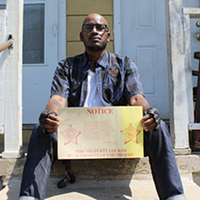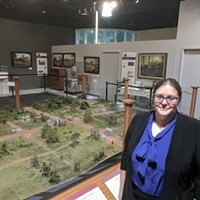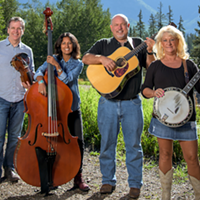Chris and I are riding home from church when I bring up local politics. I'm interested in what he thinks about the creeping development that is beginning to put some pressure on the edges of Enderly Park, our neighborhood.
"Have you noticed those huge houses they are building just across the tracks from us? What do you make of that?"
He has noticed, of course. The houses were built with the intention of being noticed. "Man, everybody now is talking about moving back to the city. So what they are going to do is push us out to the suburbs, and they will come back to Tuckaseegee" — that's another name for our neighborhood — "and all the other neighborhoods close by and buy up all the property. That's the thing to do now if you have money. So we're just going to get pushed out. The rent will go up, and we'll be headed out about 15 more bus stops to the other side of the highway."
Chris knows that once the hipsters and the urban pioneers show up, it won't be long before he has to start apartment hunting. The tear-downs and the renovations that will triple the size of the old mill houses here will all be signs that he is no longer welcome in the place he has called home for more than a decade.
There has been some debate lately as to whether we know what we mean when we talk about "gentrification." According to some economists at the University of Virginia, the phenomenon is very rare. It is confined only to extremely rapid change in the largest urban areas — New York, San Francisco, Washington, D.C., and a few others. Outside of those places, they say, the poor do not move from any particular neighborhood at a higher rate than they move from any other neighborhood, whether that neighborhood is said to be "gentrifying" or not.
Others think they are ignoring the obvious displacement that happens in changing urban neighborhoods. While such a process does not happen overnight, the gradual change over the course of a decade makes a significant difference to the lives of people who have inhabited that place for years.
Still others can say that change is the norm for urban neighborhoods. One of the qualities that makes old neighborhoods interesting is their adaptability. There has never been a time when Tuckaseegee was not changing in some way. The same is true for nearly every urban neighborhood around the country.
To further complicate matters, not all of the changes that are brought about by gentrification are bad changes. Tuckaseegee could use further density, some locally driven economic development, and the repair of many homes that have become dilapidated from years of sitting vacant. All of those changes could potentially increase the quality of life here, intensifying the vibrancy of our street life and the attractiveness of the place we call home.
About 30 percent of my neighbors here own their homes. That's not a huge number, but it is significant. When the development bug hits, those 30 percent stand to profit from their years of work to pay for their homes.
Still, I'm discontent with the pressure we are starting to feel from the coming developers. I am so because Chris's description of what will eventually come, even if it is years from now, is summed up in his pronouns. There is a "them" and an "us." And those two categories break down along the usual lines. The poor and the middle class. The black and the white. The underclass and the propertied class. Many of those who will move here will cite the desire to be part of "a diverse neighborhood." By moving here, they will ensure that such diversity is fleeting as the poor are gradually pushed out. I'm personally afraid that although my intentions are different, the results of my presence here will finally be the same. While I feel like one of "us," I bear all the markers of being one of "them."
Being rooted on Tuckaseegee has taught me how deeply important a place and its people are. This place is more than an investment or an opportunity for profit. It is a living, breathing space full of joy and grief and wonder. The rush to turn a profit, when it finally comes, can only cheapen that.
Greg Jarrell is a founder of QC Family Tree, a community of hospitality in west Charlotte. This column originally appeared on the Baptist News Global Perspectives site and is reprinted with permission.
Speaking of...
-

Alvin C. Jacobs Jr. Shines a Light on Brookhill Village in New Gantt Center Exhibit
Sep 5, 2018 -

As the Youngest President of the Charlotte Museum of History, Adria Focht is Bringing Us Into the Present Through the Past
Aug 8, 2018 -

River Ratz Talk About Their Family-Friendly "Fun-Grass" Vibe
Jul 25, 2018 - More »
Latest in City Forum
Calendar
-

Wine & Paint @ Blackfinn Ameripub- Ballantyne
-

Queen Charlotte Fair @ Route 29 Pavilion
-

NEW WINDOW GALLERY-Pat Rhea-ACRYLIC PAINTINGS-April 05-30 2024 VALDESE, NC 28690 @ New Window Gallery/Play It Again Records
- Through April 30, 12 p.m.
-

TheDiscountCodes
-

Face to Face Foundation Gala @ The Revelry North End
-
Esports in Charlotte Takes Off: A Guide to Virtual Competitions and Betting
-
Canuck in the Queen City 7
A Canadian transplant looks back at her first year as a Charlotte resident
-
Homer's night on the town 41
If you drank a shot with the Knights mascot on Sept. 20, you were basically harboring a fugitive









